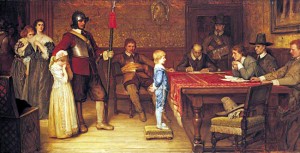Robert MURCH was born in 1687 in Ottery St Mary, a town later described by White in his 1850 directory as “...an ancient and irregularly built market town ... picturesquely seated on the east side of the river Otter, sheltered on the east and west by boldly swelling hills.” This makes Ottery sound as if it is a typically sleepy town, where nothing ever seems to happen. However, in the 17th century, the population was swept up in the battles and skirmishes of the Civil War between the supporters of King Charles I and Parliament (Oliver Cromwell).
Names of battles at Nottingham, Edge Hill, Marston Moor, and Naseby are familiar to most. But the Civil War was fought not only in faraway counties, it was also fought in Devon. Royalist regiments under Lord Wentworth were camped at nearby Bovey Tracey, with Parliamentary forces under General Fairfax at Crediton and Moreton, and on 9 January 1646 was the Battle of Bovey Heath. Able men were expected to join the fight, so it is likely that while Robert’s father, Richard, was still a small boy, his grandfather and male relatives participated. The fighting was fierce, and it was said that up to 10% were killed, far more than had previously died during the dreaded cholera and the bad harvests, more even than in the plagues of the Black Death in 1348-1350 and the Great Sweat in 1551.

“And when did you last see your father?”
By William Frederick Yeames
Struggles between the monarchy and Parliament were ongoing and evident – Charles was beheaded, while his son was exiled to France, and England was briefly a republic; then Oliver Cromwell died at last and his son, Richard, was dismissed from office, while the monarchy was returned to power, with Charles II as king. Charles died following a stroke in 1685, converting to Catholicism on his deathbed; only two years later, an Act of Parliament made Catholics unable to inherit the throne, while ironically another act – the Act of Toleration – granting freedom of worship to dissenters was passed.
But in 1688, when Robert was one, there was a revolution in England of a different kind. This was a revolution of religions. In 1689 the Declaration of Rights confirmed that Catholics were barred from the throne of England. The Act of Toleration granted freedom of worship to dissenters – but upon conditions. Dissenters were allowed “to hold services in licensed meeting houses and to maintain their own preachers (if they would subscribe to certain oaths) in England and Wales.” (David Cody, The Victorian Web). The term “Dissenters” is misleading, however; the Toleration Act applied to Baptists and Congregationalists but not to Protestant Dissenters like Robert, which is why he had to marry in the local Anglican church.
Ros Haywood
Murch Surname Study
http://murch.org
